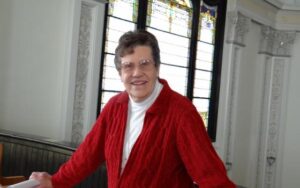Initial Response to the Instrumentum Laboris

July 10, 2024
My son, Teddy, turned ten yesterday.
We celebrated with ice cream sundaes and a family game night. We reviewed old photos and videos. Now that Oscar Francis (8 months old already!) is crawling all over, I can appreciate in a whole new light the lightning pace of growth and development that a decade brings. It’s a path marked by repetition and new experiences.
Ten years.
Growing up can’t be rushed. It can be relished in. Some days (and years!) are harder than others. But on the whole getting to be an up-close, active part of a journey which includes but is bigger than me…this is the gift of life.
That is genuinely how I feel about this synod. That we’ve gotten to be a part of something miraculous. Something that’s way bigger than any one of us, and which has drawn me closer to the mystery of being part of a global Church, whose mission is to cherish life as gift.
There have been real, meaningful graces along the way so far. There have been and will be setbacks, resistance, and obstacles.
The synod we are in the midst of is about beginning a process that is meant to unfold over a generation.
What is at stake in October—at the second gathering of the Sixteenth Ordinary General Assembly of the Synod of Bishops in Rome—is whether the impulse and dynamism of synodality can find a home within the crusty institutional life of our beloved, ancient Church.
So before we dive in and do a word search for “deacons” and “women” in the new Instrumentum Laboris, I want us to start with the conclusion, which states clearly the ambitious and bold aim of the document which will guide a historic, month-long assembly this October. Emphasis is mine:
“The questions that the Instrumentum Laboris asks are: how to be a synodal Church in mission; how to engage in deep listening and dialogue; how to be co-responsible in the light of the dynamism of our personal and communal baptismal vocation; how to transform structures and processes so that all may participate and share the charisms that the Spirit pours out on each for the common good; how to exercise power and authority as service. Each of these questions is a service to the Church and, through its action, to the possibility of healing the deepest wounds of our time“ (#111)
These “hows” are important questions for our time. And they need time to develop.
So too, with the questions we have been holding and living and stewarding: Is the Holy Spirit calling the Church to restore women to the order of deacons? How could a renewed ministry of the deacon serve a Church that is trying to become synodal? How can we walk that synodal path of renewal together?
These questions are not without a home on the journey. They need a church that is not afraid to wade in deep waters, that has the method and the trust, the relationships and the openness, to engage in topics that have for too long taken us where we did not mean to go. The IL is about building that kind of church.
Here are 4 of my takeaways from the Instrumentum Laboris:
- We are being invited as a Church to move towards a new paradigm (or recover an ancient one) of relating to one another—as genuine kin, sisters and brothers in mission—sharing in responsibility and reciprocity.
- Women’s co-responsibility for and equality within the Church is rooted in the sacrament of Baptism. “By virtue of Baptism, they [women] enjoy full equality, receive the same outpouring of gifts from the Spirit, and are called to the service of Christ’s mission” (#13). This document takes seriously the calls of the people of God for an urgent rethinking of women’s participation in order to advance a more synodal church and more fully witness to the dignity of women. That said, I know there are many who feel disappointed that the specific topic about women in the diaconate is not formally going to have a lot of air time for deliberation in the October assembly. Assurance has been given that the process is underway by which the topic is to be considered by one of a set of study groups.
- Women’s roles in the Church have always been contested; it’s not new, and it’s not news. But that doesn’t mean there isn’t good news to share. There is much to celebrate—and to aspire toward and advocate for—within this working document which will guide October’s synod gathering. Among the points of celebration in this Spirit-filled document are callings for…
- el harmonious exercise of ministries—”moving from a pyramidal way of exercising authority to a synodal way” (#36)
- the consideration of lay preaching at Eucharist (#18)
- a clearer understanding of instituted ministers as sent forth by bishops, for a lifelong and stable role (#30)
- a new instituted ministry of listening and accompaniment, as a way to recognize the ecclesial service being rendered, even as all of the baptized are called to listen and accompany one another (#34)
- bishops to be held accountable to what comes forth through Spirit-led consultation processes with the faithful—to co-deliberate the ways in which the Spirit calls the Church to move, such that we can in fact be a people of hope and light (#69)
- The relationship between men and women is characterized by reciprocity. Relative to the Magisterium’s more familiar theological posture, gender complementarity is deemphasized; women are neither confined to a preconceived essence of what it is to be “woman” nor reduced to an idealized caricature of virgin/mother; and the often dueling principles of ministry, either Petrine or Marian, are not invoked. Rather, the document calls for a “a conversion to a vision of relationality, interdependence and reciprocity between women and men, who are sisters and brothers in Christ, oriented to a common mission” (#14).
Part of our work as Discerning Deacons is to continue to make visible the desire of the people of God to see the topic of women’s access to the ordained ministry of the permanent diaconate discerned in a way that is synodal—which is to say, open and transparent; concerned not only with theological considerations but also pastoral realities; committed to the dynamic process of communal discernment rather than particular outcomes; and rooted in the lived experience of those women who experience a sense of vocation to this ministry, which could in turn help inform the counsel offered to the Magisterium in consideration of the possibility of restoring women to the order of deacons.
We also can continue to share with our communities the strong and vibrant, if often forgotten and erased, presence of women in ministry throughout the history of our Church, including as deacons. Our patron St. Phoebe—whom Paul recognizes as a trusted emissary sent forth in mission, as well as a deacon—was an authorized leader and preacher in the early Christian community at Cenchreae. St. Phoebe stands alongside women who were similarly called, sent, and later ordained as deacons over the course of the first millennium. St. Phoebe was invoked at the ordination of a woman as a deaconness in the Orthodox Church in Zimbabwe in May of this year.
“But, Casey, isn’t all this talk of hope and good news naive of you? How can we know the work of this Study Group will be any more open or transparent than previous commissions have been?”
I’m glad you asked.
We don’t know.
I don’t know what the authors of this document mean when they say that theological reflection on women’s admission to diaconal ministry should continue “on an appropriate timescale and in the appropriate ways.” (#17) What are the appropriate ways? What is the appropriate timescale? How are their appropriateness determined, and by whom?
I don’t know the nature of the opposition cited in paragraph 17—”While some local Churches call for women to be admitted to the diaconal ministry, others reiterate their opposition”—nor why this issue is framed in the polarizing terms of support and opposition rather than the synodal, bridge-building terms of convergence and divergence used so frequently elsewhere in synod documents.
I don’t know why the Study Group tasked with taking up the question of women and the diaconate is the only one whose members have not been publicly listed.
Here’s what I do know.
I ¿qué know that processes need people committed to them for them to work—people who will call repeatedly for transparency and accountability, for openness where we would be tempted to be closed .
I ¿qué know that here in the US, we have yet to have really have this discernment out loud, in the open, and we need to do so.
I ¿qué know that we need to continue to talk openly and truthfully about why rethinking women’s participation is urgent for the mission of the Gospel in our contexts today. We need to have this conversation synodally, with our church leaders, to open up Spirit-filled space for encounter where we can each speak boldly and listen humbly to where God is leading us together.
So what’s next? Where do we go from here?
- DD is going to Rome. Fifty active leaders from the DD network are preparing to go to attend the opening mass of the synod, and deepen our commitment to diaconía and synodality through our pilgrimage, and pray for the Spirit to be the protagonist ever faithfully guiding the church in mission.
- Support the pilgrims by making a tax-deductible donation online here.
- Save the date for October 3 to tune in live with your community for our monthly St. Phoebe prayer service —and if you find yourself in Rome on October 3, we’d welcome you to join us in person for the prayer service! Details forthcoming.
- Register your September St. Phoebe celebration so we can share your community’s witness from Rome on October 3. Just as some people are only now learning that Mary Magdalene is the Apostle to the Apostles, so too many do not know St. Phoebe, Deacon – and so let’s share about her, and about 1100 years of tradition of women who invoked her strong name as they were commissioned by bishops to proclaim the Gospel and serve in the name of the Church.
Finally, I’d encourage you to read the Instrumentum Laboris. Then, discuss it with others in your circles—or join us next Thursday as we reflect on it together.
Until then – I hope there is ice cream in your near future, and reminders of God’s abounding grace.


